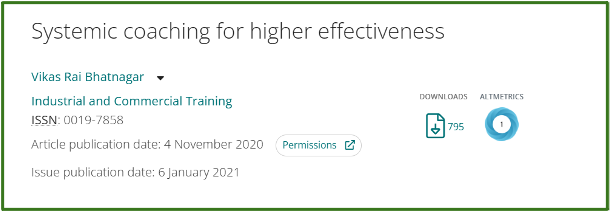Systemic coaching for higher effectiveness
Purpose
Practitioners’ literature on coaching has swelled as compared to the theoretical grounding and academic research on coaching, thereby questioning if coaching is a profession. Furthermore, the increasing investments in coaching seek a higher return on investments. These trends call for a deeper theoretical grounding of coaching and evolving innovative approaches that increase the effectiveness of coaching. Against this backdrop, this study aims to describe a process a coach can adopt for objectively and systemically understanding the context of the coachee at multiple levels (organisational, teams/dyadic and interpersonal) to develop and execute an effective coaching intervention.
Design/methodology/approach
This study uses a radical humanistic paradigm, deploys ecosystems theory, develops a conceptual model and uses it for action researching in an Indian manufacturing organisation. This study uses a non-experimental purposive sampling and makes use of a cross-sectional survey method for gathering data by using validated instruments. Guided by the ecosystems theory, data is gathered at three levels of nested systems – the microsystem (interpersonal and direct reports of coachee), meso system (peers and manager of coachee) and the macro system (cultural) levels. Analysis of data helps the coach to design and execute an effective coaching intervention at multiple levels – interpersonal, dyadic and organisational.
Findings
This study provides an alternative approach to systemically diagnose at three levels of the environment (microsystem, meso system and macros ystem) and uses validated instruments for assessing the areas of opportunity and concerns for carrying effective coaching. The use of employee strengths that conceives strengths as a dynamic interaction of personal attributes and contextual factors instead of the trait-based conceptualisations in extant literature leads to rich data for designing effective coaching interventions. Using the ecosystems theory for carrying out systemic coaching is an effective approach for professionalizing coaching and increasing the effectiveness of coaching.
Originality/value
The originality of this study lies in using the ecosystems theory for guiding the research, developing the conceptual model, collecting data by using validated instruments and in making use of data across multiple levels of systems (micro, meso and macro) for carrying out systemic coaching. The use of a new higher-order construct of employee strengths at work that conceives strengths as a dynamic interaction of personal traits and contextual factors is yet another originality of the research. Finally, this study identifies key systems variables and provides a proof of concept by executing a generalisable systemic coaching process in an organisation.


